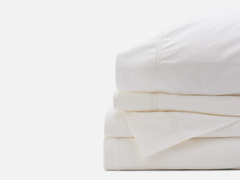Learning how to prolong the life of your cotton bed linen is an integral part of taking care of them. Who wants to buy sheets every few months? If you don’t care for your sheets properly, they’ll accumulate stains and tears over time. They’ll shrink, and the texture won’t be as comfortable as it should be. To help you avoid this, we’ll take you through a few ways to prolong the life of your cotton bed linens so that you can enjoy fresh, crisp sheets for longer.
Wash Your Sheets Once a Week
We spend about 50–65 hours in bed each week. While we need this time to thrive in our daily lives, sleeping can also contribute to the build-up of gunk, skin oils, dead skin cells, sweat, and bacteria that make their home between your sheets. This could lead to many issues, including skin breakouts, allergies, asthma, etc.
We practice proper hygiene daily, so why not do so with our sheets? You must wash your linen at least once a week to keep it clean and bacteria-free. Of course, some people wash them more often. Washing more often is important if you allow your pets to sleep in your bed or if you experience allergies and asthma. Clean your sheets frequently and see if the problems improve. If they do, you can keep washing at that rate.
How To Wash Sheets
So now that you know that it’s important to wash your sheets, you might be asking yourself what the process should look like. We’ll outline it below.
Follow Care Instructions
How many of us take our sheets off the shelves, take them home, and throw the tag away? These instructions on the tag are crucial for prolonging the life of your sheets since they help you understand how to best take care of them. These instructions should tell you the proper rinse cycle and heating for the dryer and how to store them later.
Cotton comes in different weaves, so you must know what works best for that weave before you throw it in the washer or dryer. So check the instructions before your first wash and follow them to a T.
Avoid Chemical Detergents
Harsh chemical detergents can cause the fibers of your cotton sheets to break down. Additionally, it may be why your allergies tend to flare up in the morning and evening while you’re fine throughout the day. Your sheets may be the culprit if you wake up with puffy eyes, a runny nose, and a tingling throat. Using a gentle detergent is the best way to preserve the fibers of your sheets and leave them fresh and crisp every time you get them out of the washer. If you follow our instructions, they’ll look brand new after every wash.
Wash Your Sheets Separately
We understand that you want to save time when you’re doing laundry. You also likely want to save money. Doing multiple loads can cause you to use more electricity and water than you would like. But when you throw your sheets in the wash, you’ll have to separate them. Otherwise, the friction with other, heavier fabrics—like rough T-shirts and jeans—will cause tiny tears in the fiber, which will cause a big problem later down the line. These tears will only get bigger with time, which decreases the longevity of your sheets.
Washing your sheets isn’t as much of a problem as you think, though. As stated above, most people wash their sheets once a week. This means fewer loads overall and more savings in your wallet.
Dry Your Sheets on Low Heat
When you throw your cotton sheets in the dryer, dry them on low heat. There isn’t a worse feeling in the world than waking up to find that your bed sheets snapped off the edges because they no longer fit. This happens if you dry your linens on high heat in the dryer. Additionally, the sheets will lose their crispness. This can lead to them feeling less comfortable. An alternative to throwing them in the dryer is air drying them on a clothes hanger outside. This is perfect for the summer heat, as it’ll dry quickly. Let’s be honest: what’s better than warm sheets that you’ve dried in the wind?
How To Store Them
Now that you’ve washed and dried your sheets, the final step is to store them properly. The best way to store sheets is to keep matching sheets together. Put the folded sheet set inside a matching pillowcase. This is great for storing your sheets in a linen closet where you don’t have a lot of room to spare. You can also place the pillowcases and folded fitted sheets inside the flat sheet right before its last fold. This keeps your linen organized. Finally, you might also want to label them by room or size if you have various sheets in your linen closet.
Signs It’s Time To Replace Them
We know you want to keep your sheets for as long as possible, but sometimes it’s time to buy new ones. If you see large holes in your linen, it might be time to get new ones, as they’ll only get worse when you toss and turn throughout the night. You can mend smaller holes before this happens, but you should consider getting new ones.
Another sign that it’s time to get new sheets is when they have large stains in them. We all love a good cup of coffee or wine in bed. However, if you spill something and can’t remove the stains, it might be time to get new sheets. Smaller stains aren’t a huge deal; you can usually handle that with equal parts white vinegar, dish soap, and hydrogen peroxide. However, if your sheets are starting to look like hardworking artists’ work pants, it might be time to get new linens.
If the time has come for you to get new bedding, check out what we have to offer at Red Land Cotton. We have the best American-made luxury cotton sheets in the industry. They’re crisp and made of all-natural cotton. Check out our offer, and contact us if you have any questions.









